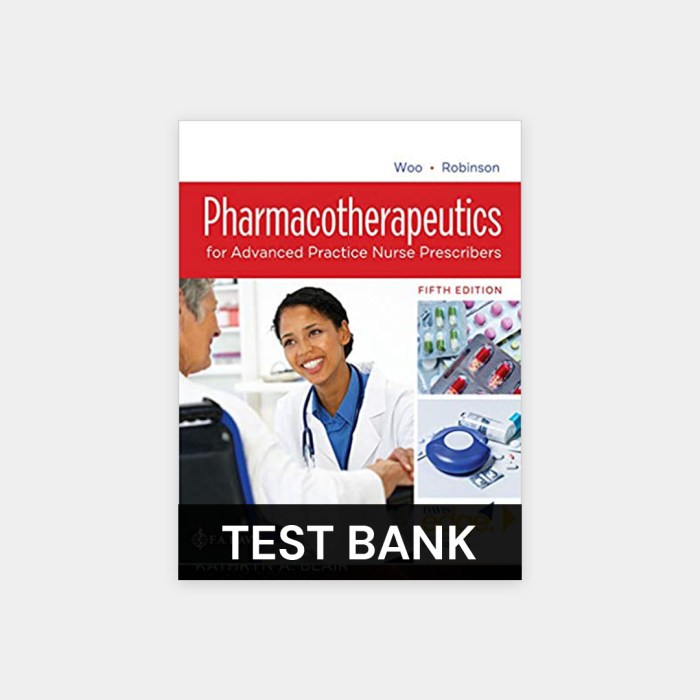Pharmacotherapeutics for advanced practice nurse prescribers test bank is a valuable resource that provides a comprehensive review of the essential concepts and principles of pharmacotherapeutics, enabling advanced practice nurses to enhance their knowledge and competence in medication management.
This test bank is designed to assess nurses’ understanding of drug classification, mechanisms of action, therapeutic uses, pharmacokinetics, and pharmacodynamics, ensuring they possess the necessary knowledge to make informed and effective prescribing decisions.
Pharmacotherapeutics for Advanced Practice Nurse Prescribers Test Bank: Overview
Pharmacotherapeutics plays a pivotal role in empowering advanced practice nurse prescribers (APNPs) to optimize patient outcomes through appropriate medication selection and management. This test bank serves as an invaluable resource for assessing their knowledge and competence in this critical area of practice.
Key Features and Benefits of a Comprehensive Test Bank
- Provides a comprehensive assessment of APNPs’ understanding of pharmacotherapeutics principles, drug classification, mechanisms of action, therapeutic uses, pharmacokinetics, and pharmacodynamics.
- Identifies areas for improvement and targeted continuing education needs.
- Enhances confidence and proficiency in prescribing medications, ensuring safe and effective patient care.
Essential Concepts in Pharmacotherapeutics: Pharmacotherapeutics For Advanced Practice Nurse Prescribers Test Bank
Pharmacotherapeutics encompasses the principles governing the use of medications to treat and manage diseases. APNPs must possess a thorough understanding of:
Drug Classification, Mechanisms of Action, and Therapeutic Uses
- Drug classification systems (e.g., anatomical, therapeutic, chemical)
- Mechanisms of action at the molecular and cellular level
- Therapeutic uses and indications for various drug classes
Pharmacokinetics and Pharmacodynamics, Pharmacotherapeutics for advanced practice nurse prescribers test bank
- Drug absorption, distribution, metabolism, and excretion (ADME)
- Drug concentration-effect relationships
- Factors influencing drug response (e.g., age, weight, genetics)
Therapeutic Management of Common Conditions
| Disease States | Pharmacological Interventions | Nursing Considerations |
|---|---|---|
| Hypertension | ACE inhibitors, beta-blockers, diuretics | Monitor blood pressure, assess for side effects |
| Diabetes mellitus | Insulin, metformin, sulfonylureas | Blood glucose monitoring, dietary management |
| Depression | SSRIs, SNRIs, TCAs | Monitor for adverse effects, provide emotional support |
Evidence-Based Practice in Pharmacotherapeutics

APNPs must adhere to evidence-based practice principles to ensure the optimal use of medications. This involves:
Evaluating and Interpreting Clinical Research
- Critically appraising research studies
- Assessing the strength of evidence
- Applying research findings to clinical practice
Special Considerations in Pharmacotherapeutics
Geriatrics
- Age-related physiological changes
- Polypharmacy and drug interactions
- Monitoring for adverse effects
Pediatrics
- Developmental differences in drug metabolism and response
- Appropriate dosing and administration
- Parental education and support
Pregnancy
- Drug safety during pregnancy
- Monitoring for fetal effects
- Counseling on medication use during lactation
Ethical and Legal Implications
Informed Consent
- Ensuring patients understand the risks and benefits of medications
- Obtaining written consent before prescribing
Confidentiality
- Protecting patient privacy
- Maintaining confidentiality of medical records
Adherence to Regulatory Guidelines
- Following prescribing guidelines and protocols
- Documenting medication orders and monitoring
User Queries
What are the key features of a comprehensive pharmacotherapeutics test bank?
A comprehensive pharmacotherapeutics test bank typically includes a wide range of practice questions covering essential concepts, therapeutic categories, and clinical scenarios, providing a thorough assessment of nurses’ knowledge and competence.
How can test banks enhance the preparation for certification exams?
Test banks align with certification exam blueprints, providing nurses with targeted practice and feedback, helping them identify areas for improvement and increase their chances of success on the actual exam.
What are the benefits of incorporating evidence-based practice in pharmacotherapeutics?
Evidence-based practice ensures that medication decisions are grounded in the latest research and clinical guidelines, leading to improved patient outcomes, reduced adverse events, and enhanced cost-effectiveness.